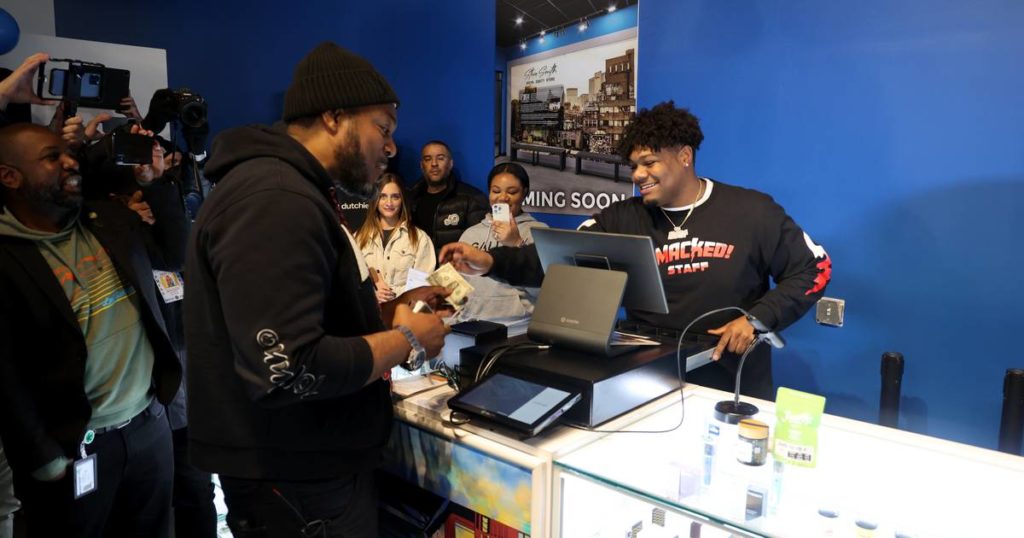The determination of New York’s leaders to do the right thing keeps crashing into their inability to do it the right way.
The whole idea of marijuana legalization here — aside from the rounding-error tax revenue it’s supposed to add to the $320 billion and change that New York State and City collectively spend in a year — has been to make sure that people and communities that were punished as use was evenly distributed across racial and ethnic lines while stops, arrests and convictions were certainly not would get a head start selling in this new, licensed marketplace before bigger and better-financed operations get in the mix.
What’s happened instead is that people who still don’t see any reason to render unto Caesar are making bank with little chance of getting charged with anything or otherwise pushed out of the game while “justice-involved” people who slogged through paperwork are mostly stuck on the sidelines.
The city’s first two licensed weed stores, one owned by the nonprofit Housing Works and the other a “pop-up” called Smacked owned by a 50-year-old who was repeatedly arrested and convicted for possession in the early 1990s, are just a half mile away from each other in the Village.
Darius Conner makes the first official sale to his father, Roland Conner, at the opening of Smacked in Manhattan on Tuesday. (Luiz C. Ribeiro/for New York Daily News)
Walking between them, there are more than a dozen unlicensed stores openly selling arguably better product (Housing Works Cannabis Co. has had an “Out of Edibles” sign taped to its window for at least a week) at inarguably better prices, skipping those pesky taxes and passing on the savings.
You don’t need to be stoned to appreciate this quote from Reuben R. McDaniel III — who as the Dormitory Authority CEO and president, as well as a member of the state Cannabis Control Board, is the guy responsible for finding locations for New York’s brand-new licensed pot stores — but it helps:
“I don’t think any of us expected the complications with mortgages and landlords who didn’t want to approve the use,” he told the New York Times.
Funny, there sure seem to be a lot of landlords with no problem approving the use for stores without licenses.
The Office of Cannabis Management, which isn’t a law enforcement agency, sent a handful of cease-and-desist letters a few months back to landlords and operators, with no clarity about how they pulled those needles from the haystack and no real teeth.
The NYPD, in the meantime, has interpreted the state law as meaning they can’t do anything about unlicensed stores openly advertising cannabis unless an officer actually witnesses a sale.
That’s let the cops mostly take a backseat to the much smaller sheriff’s office, which as the enforcement arm of the Department of Finance has been seizing inventory here and there — along with the crews of armed robbers doing the same around the city.
(NYPD Chief of Patrol John Chell testified at a City Council hearing that one way the police are trying to cut down on those robberies, with 593 of them last year compared to 137 in 2021, is by distributing “literature on how to protect themselves vis-à-vis cameras, lighting, buzzer systems.”)
In the meantime, what was supposed to be a $200 million Social Equity Cannabis Investment Fund including $150 million from investors to support turnkey build-outs in locations selected by the Dormitory Authority for the first 150 licensed retail dispensaries for justice-involved applicants, reportedly hasn’t raised anything past the $24 million the state’s already put in.
Funny, there sure seems to be lots of private capital for unlicensed operations.
When Housing Works’ pot shop opened just after Christmas to provide New York’s first licensed sales, Gov. Hochul proclaimed it a tangible sign of “New York as a national model for the safe, equitable and inclusive industry we are now building.”
Cannabis Control Board Chairwoman Tremaine Wright added that, “for years we fought to make sure New York not only legalized cannabis but did so in a way that ensures this cannabis market is driven and led by social equity.”
Those are promises thinner than a leaf of rolling paper.
Mayor Adams in his State of the City speech Thursday talked about “a new loan fund to help more New Yorkers who were impacted by the war on drugs to start new businesses,” and then about how “we are not going to let bad actors undermine the promise we made to New Yorkers who were impacted by marijuana criminalization.”
But that’s already happening, regardless of whether those are “bad actors” or simply people who recognize the vast, profitable space between rhetoric and reality here.
While New York’s pols keep blowing smoke, there’s lots of green to be made.
H/T: www.nydailynews.com



